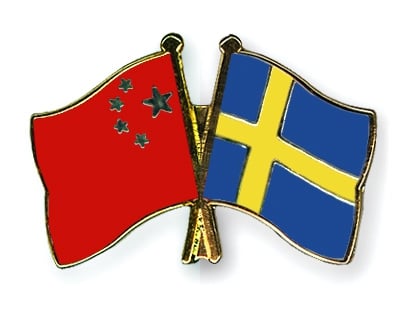
Following the disappearance of three shareholders and two staff members from a bookstore in Causeway Bay, Hong Kong, Swedish diplomacy has unwillingly been drawn into the international spotlight. One of the missing bookseller’s, Gui Minhai, was given Swedish citizenship in 1996 after studying in Sweden in the 1980s. Despite Gui having requested in a video posted by China’s official media that Sweden did not intervene in the affair, the Swedish government could not ignore the incident because of diplomatic protocol.
The Swedish Foreign Ministry has also made clear that it does not accept China’s response to the situation. A consular official from the Swedish Embassy has voiced its government’s annoyance at having a request for contact with Gui turned down. The embassy has also repeatedly asked for clarification from China over the incident.
Ironically, Sweden is perceived as being one of China’s closest allies in the West. During the Cold War, Sweden was one of only a few countries that maintained a workable relationship with China; the positive tie between the two countries was probably one reasons why Gui went to Sweden to study. Although Sweden was once a European hegemonic power, it has adopted a policy of neutrality since its influence has declined.
In 1950, diplomatic relations between Sweden and China were officially established and ambassadors were exchanged. This marked Sweden as the first Western state to establish diplomatic relations with communist China. Sweden also supported the admission of China to the UN, and bilateral trading and economic relations between the two countries were built before those with any other Western country.
Today, Sweden is China’s biggest trading partner in Northern Europe, while in turn China is the biggest export market for Sweden. Recently, Sweden has strengthened its cooperation with China in the field of Corporate Social Responsibility (CSR). As IKEA has become an international paradigm in terms of its contribution to CSR, it has also become the role model for China’s “Opening-up Policy” and “One Belt One Road” initiative.
Another characteristic of Swedish diplomacy is its “human rights diplomacy*.” As a member of the European Union and the home of the Nobel Prize, Sweden uses “the protection of human rights” as part of its “soft power diplomacy.” It has proactively criticized human rights violations by other countries, for example, the US’ bombing of Vietnam and the invasion of Czechoslovakia by the USSR. Sweden has also been the main fund provider for the UN Human Rights Council, Refugee Council and others.
As a consequence, Sweden is seen as an appropriate location for NGOs involved in international human rights and civil society to establish themselves. More recently, the EU has included “human rights” as an important value in promoting its own external relations, and in doing so, mirrors Sweden’s strategy of “human rights diplomacy”.
There are precedents for Sweden jeopardizing its economic interests in order to safeguard its “human rights diplomacy”. For example, in 2015, Saudi Arabia cancelled the opening address at an Arab League meeting in Cairo which was to have been given by the Swedish minister of foreign affairs; it was irritated because the speech contained comments about women’s and human rights. The minister in question had earlier criticized Saudi Arabia’s lashing and jailing of a blogger for “insulting Islam”.
When Saudi Arabia cancelled the speech, Sweden immediately terminating its defense-related trade agreement with the country, which included a USD500-million-worth contract for weapons. In response, Saudi Arabia withdrew its ambassador in Sweden and criticized Sweden for interfering in its internal affairs. The tension between the two countries escalated. At the same time, the relationship between Europe and Saudi Arabia also deteriorated. However, certain EU member states, including Germany and the UK, have shown an unwillingness to go so far as sacrificing their economic interests to promote values. Sweden, on the other hand, has been able to uphold its value of human rights and earn the respect of human rights advocates.
The incident with Saudi Arabia has further links with Sweden’s foreign policy. On being appointed minister of foreign affairs, Margot Wallström announced she planned to pursue a feminist and human-rights foreign policy with an emphasis on equality. As such, Sweden recognizes Palestine as a nation and supports the state-building movement in Western Sahara, which is under pressure. Recently, Morocco (which controls the area) blocked the opening of the first IKEA store in the kingdom. A number of Swedish enterprises have since jointly urged the Swedish government to maintain an equable relationship with Saudi Arabia in order not to affect their business. This pressure has not triggered significant response domestically.
However, the Causeway Bay Bookstore saga present a different scenario as Sweden has to deal with a rising China. Beijing has posed a serious challenge to Sweden’s “human rights diplomacy.” If China provides Sweden with some room for maneuver, it is likely the issue can be solved in a restrained manner. But if it continues its present assertiveness without providing a way out for Sweden, it risks to jeopardize the long-advocated working relationship between China and Sweden.
*Human Rights Diplomacy: This recent model in Western diplomacy bears the official aim of “promoting and safeguarding human rights.” It is often used to adjust bilateral relations and economic policy in accordance with the level of human rights in the state concerned. Some states targeted in human rights diplomacy view it as a means for other nations to interfere in their internal affairs. They believe the situation in each country is different and the concept of Western human rights may not be applicable everywhere. In general, China opposes “human rights diplomacy.”